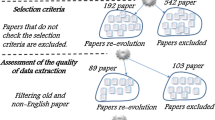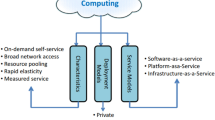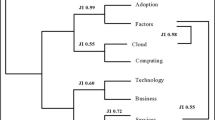Abstract
Dynamically managing service level agreements (SLAs) is a non-trivial issue for both active media technology users and providers. Cloud computing is considered as one of the significant components of the rapidly emerging active media in the current era. As the technology grows rapidly, cloud computing requirements and techniques also change over time, while the current cloud SLA management methods are rigorous in terms of SLA contents updates with the technology innovation and user requirement change. In other words, public SLAs are used as templates, and when issuing a new SLA, it is necessary to map its requirements to all public SLAs. In addition, updating any consumer’s SLA requires a cumbersome process of remapping their changed requirements to all public SLAs. This paper proposes a cloud computing SLA management mechanism based on the real options analysis concept to manage cloud SLAs in a dynamic manner. At the beginning, or when issuing a new SLA, the proposed framework receives a new user’s requirements and maps these to all public SLAs, while executes only the most appropriate SLA based on options analysis and records/marks the other related solutions (SLAs) for future analysis to address any further change due to internal/external factor. This also provides a mechanism to effectively counter uncertainty parameters triggering dynamic change in cloud SLA management. The framework was deployed using Web SLA and Java followed by an experimental study to evaluate the efficacy and scalability of the proposed framework. The results show that the proposed framework provides efficient and scalable cloud SLA management mechanism.









Similar content being viewed by others
References
Hewitt, C.: ORGs for scalable, robust, privacy-friendly client cloud computing. IEEE Internet Comput. 12(5), 96–99 (2008)
Halboob, W., Mahmod, R., Alghathbar, K., Mamat, A.: TC-enabled and distributed cloud computing access control. J. Appl. Sci. 14(7), 620–630 (2014)
Díaz-Sánchez, D., et al.: Media Gateway: bringing privacy to private multimedia cloud connections. Telecommun. Syst. 55(2), 315–330 (2013)
Du, Y., Zhang, R., Li, M.: Research on a security mechanism for cloud computing based on virtualization. Telecommun. Syst. 53(1), 19–24 (2013)
Hu, J., Deng, J., Wu, J.: A green private cloud architecture with global collaboration. Telecommun. Syst. 52(2), 1269–1279 (2013)
Patel, P., Ranabahu, A., Sheth, A.: Service Level Agreement in Cloud Computing. Knoesis Center, Wright State University, Dayton (2009)
Brandic, I., Music, D., Dustdar, S., Venugopal, S., Buyya, R.: Advanced QoS Methods for Grid Workflows Based on Meta-Negotiations and SLA-Mappings. In: 3rd Workshop on Workflows in Support of Large-Scale Science (2008)
Risch, M., Brandic, I., Altmann, J.: Using SLA mapping to increase market liquidity. In: Paper presented at the 7th International conference on Service-oriented computing (ICSOC/ServiceWave’09), Stockholm, Sweden (2009)
Brandic, I., Music, D., Dustdar, S.: Service Mediation and Negotiation Bootstrapping as First Achievements Towards Self-adaptable Grid and Cloud Services. In: Paper presented at the 6th international conference industry session on Grids meets autonomic computing (GMAC ’09), Barcelona, Spain (2009)
Maurera, M., Emeakarohaa, V.C., Brandica, I., Altmannb, J.: Cost-benefit analysis of an SLA mapping approach for defining standardized cloud computing goods. Future Gener. Comput. Syst. 28(1), 39–47 (2011)
Padhy, R.P., Patra, M.R., Satapathy, S.C.: SLAs in cloud systems: the business perspective. Int. J. Comput. Sci. Telecommun. 3(1), 481–488 (2012)
Halboob, W., Abbas, H., Haouam, K., Yaseen, A.: Dynamically changing service level agreements (SLAs) management in cloud computing, intelligent computing methodologies. Lect. Notes Comput. Sci. 8589(2014), 434–443 (2014)
Abbas, H., Magnusson, C., Yngstrom, L., Hemani, A.: Addressing dynamic issues in information security management. Inf. Secur. Manag. 19(1), 5–24 (2011)
Redl, C., Breskovic, I., Brandic, I., Dustdar, S.: Automatic SLA Matching and Provider Selection in Grid and Cloud Computing Markets. In: Paper presented at the 13th CM/IEEE International Conference on Grid Computing (GRID ’12). Beijing, China (2012)
Ludwig, H., Keller, A., Dan, A., King, R.P., Franck, R.: Web Service Level Agreement (WSLA) Language Specification. IBM Corporation, New York (2003)
Kritikos, K., Plexousakis, D.: Requirements for QoS-based web service description and discovery. IEEE Trans. Serv. Comput. 2(4), 320–337 (2009)
Tran, V. X., Tsuji, H.: A Survey and Analysis on Semantics in QoS for Web Services. In: Paper presented at the IEEE 23rd International Conference on Advanced Information Networking and Applications (AINA 2009), Bradford, United Kingdom (2009)
Chudasma, N., Chaudhary, S.: Service Composition Using Service Selection with WS-Agreement. In: Paper presented at the 2nd Bangalore Annual Compute Conference (Compute 2009), Bangalore, India (2009)
Fakhfakh, K., Tazi, S., Drira, K., Chaari, T., Jmaiel, M.: Implementing and Testing a Semantic-Driven Approach towards a Better Comprehension between Service Consumers and Providers. In: Paper presented at the IEEE 24th International Conference on Advanced Information Networking and Applications Workshops (WAINA ’10), Perth, Australia (2010)
Muñoz, H., Kotsiopoulos, I., Micsik, A., Koller, B., Mora, J.: Flexible SLA negotiation using semantic annotations. In: Paper presented at the 7th International conference on Service-oriented computing (ICSOC/ServiceWave’09), Stockholm, Sweden (2009)
Abbas, H., Yngström, L., Hemani, A.: Adaptability infrastructure for bridging IT security evaluation and options theory. In: Paper presented at the 2nd International Conference on Security of Information and Networks (SIN’09), Famagusta, Cyprus (2009)
Abbas, H., Yngström, L., Hemani, A.: Option based evaluation: Security evaluation of IT products based on options theory. In: Paper presented at the 1st Eastern European Regional Conference on the Engineering of Computer-Based Systems: Setting New ECBS Frontiers, Novi Sad, Serbia (2009)
Acknowledgments
The authors would like to extend their sincere appreciation to the Deanship of Scientific Research at King Saud University for its funding of this research through the Research Group Project No. RG-1435-048.
Author information
Authors and Affiliations
Corresponding author
Rights and permissions
About this article
Cite this article
Halboob, W., Abbas, H., Khan, M.K. et al. A framework to address inconstant user requirements in cloud SLAs management. Cluster Comput 18, 123–133 (2015). https://doi.org/10.1007/s10586-014-0408-6
Received:
Revised:
Accepted:
Published:
Issue Date:
DOI: https://doi.org/10.1007/s10586-014-0408-6




